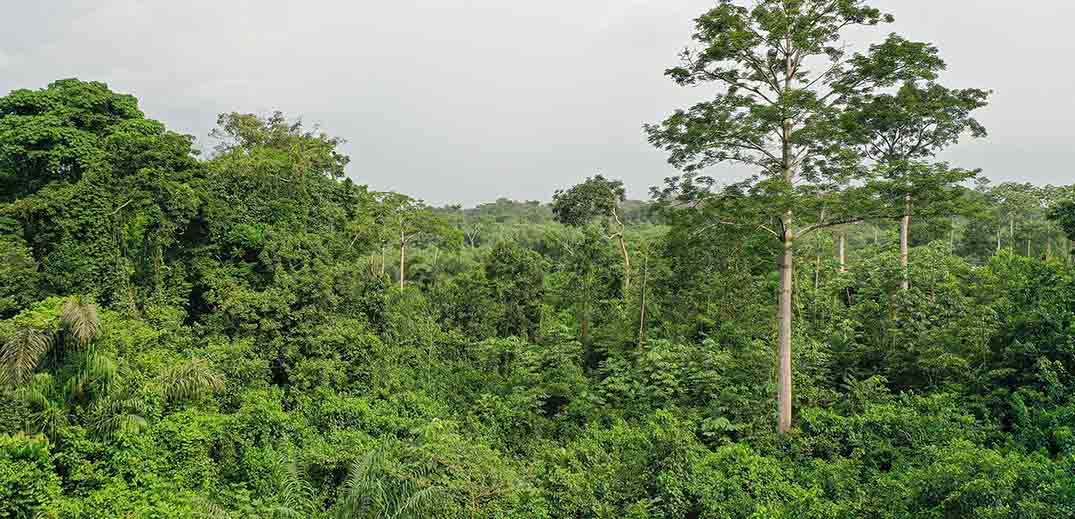I also remember that it was the community who took the initiative to restore their small forest areas. They had the ideas and did much of the work involved in planting – we just supported them.
Toa Zèo is a small cocoa-growing community in western Côte d'Ivoire. Nestlé has been working with the community here for several years through our Nestlé Cocoa Plan, where we strive to make cocoa farming more sustainable and cocoa-growing communities more resilient.
I was happy when the community reached out to the Ministry of Water and Forests (MINEF) and to our team at Nestlé. Together, they saw the opportunity to protect and restore several small forests between one and 16 hectares in size. All of which are not protected at a national level, but are important to local communities and at risk from encroachment.
Deforestation is a big issue in Côte d'Ivoire. Over the last 60 or so years, the country has lost around 90% of its tree cover. Our neighbors in Ghana are sadly facing a similar situation. On a personal level, as an Ivorian, I find this distressing and intensely motivating. It's the reason I chose to join Nestlé in 2019 as the environment and forest manager for Côte d'Ivoire.
The work we are doing in Toa Zèo—protecting four small forests, planting around 8,700 trees to mark forest boundaries. and planting 37,000 teak trees on the community's borders—has been so successful that we will be working with Ministry to roll the model out to other areas of Côte d’Ivoire.
Community leadership (not just involvement) has been key to the success of the project. The community selected the species of trees they wanted from our nurseries (trees indigenous to the area, often traditionally used for food and medicine). They also decided on the approach to mark forest borders. And importantly, they formed a committee of young adults to take on the restoration work and to monitor the forests going forward.
The forests and our traditions are deeply linked. It fills me with hope for the future that we can begin to help protect these small community forest areas, particularly those that are considered sacred.
But of course, it's also important for us to work at a larger scale. We're in a moment of collaborative action: farmers, communities, governments, companies, and NGOs, are building more effective partnerships than ever before. No matter the scale, the role of empowering communities is the major determinant of success. This is clear from our work with communities and partners in the much bigger Beki and Bossematie Forests and in Cavally Forest Reserve.
Beki and Bossematie forests are a crucial wildlife corridor for some of the last remaining elephants in Côte d'Ivoire. This project in particular was a critical example of collaboration between the government, local communities and partners, and Nestlé. Each partner took the time to listen and to foster a shared understanding and objective. Together, we've reforested key areas of degraded forestland, created action plans for a five-kilometer buffer zone around the forests, and helped local cocoa producers improve their incomes.
Cavally Forest is one of the largest remaining forest reserves in Côte d’Ivoire, but large areas of it have been degraded.
A patrol in the Cavally Forest Reserve, photograph courtesy of Earthworm Foundation
Working with local communities and the Ministry, we've supported community-led patrols of the forests – removing illegal cocoa plantations and replanting huge volumes of forest trees. We also work holistically to support a living income for cocoa farmers in the area, making sure that they're rewarded for sustainable and socially responsible practices and don’t face economic pressure to expand cocoa growing in a way that threatens the forest.
Why all this focus on forests? One key element is that forests are good for cocoa – it's a crop that evolved to grow in a forest microclimate. Forests also help create optimal amounts of rainfall for cocoa plants as well as healthy micro-organisms in the soil. They are also good for the communities that depend on them for nutrition, shelter, medicines, and livelihoods. Forests are important for the long-term sustainability of communities and cocoa as a crop. It is as simple as that.
Forests are important for the long-term sustainability of communities and cocoa as a crop. It is as simple as that.Diomandé
Conserving and restoring forests and other natural landscapes is also important for bigger Nestlé goals. One urgent action for us to achieve Net Zero by 2050 and to implement our Forest Positive strategy, which begins with achieving and maintaining deforestation-free supply chains.
Together with the cocoa industry, we work within the Cocoa & Forests Initiative to achieve this objective with the joint support of the Ivorian and Ghanaian governments. We've pledged to make our cocoa supply chain deforestation-free by 2025 and have recently released our 2022 report, which shows our progress towards that goal transparently.
What gives me the most hope of all is the steps we've taken with partners to truly center community leadership in the work to protect forests.
Communities are taking action to protect standing forests and to restore those that have been degraded. At Nestlé and across the industry, our role is to invest in helping these communities protect their local forests, because they are key to a future where forests are protected and thrive.










